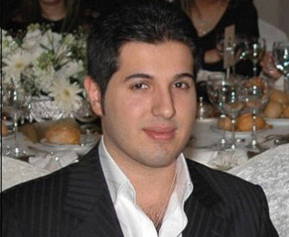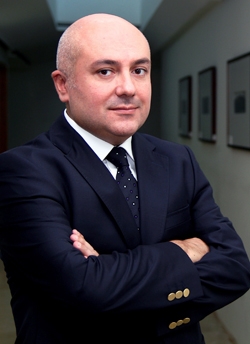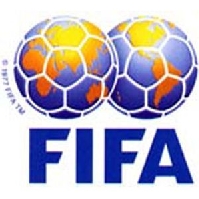January 03-2014

. . . Iran gold dealer
Most of the Turkish media are saying the corruption scandal that has erupted in Turkey is centered chiefly on the sale of Turkish gold to Iran as a way around US sanctions.
The United States has had nothing to say about the developing scandal that has engulfed the government of Prime Minister Recep Tayyip Erdogan.
The police have said little and there is no official description of the charges. It isn’t clear if the news reports citing Iran are accurate or mere speculation.
One English language daily, Today’s Zaman, last week said much of he media was just jumping to the conclusion that Iran was involved because the bank at the center of the scandals is Halkbank, which at one point handled payments to Iran before sanctions shut the tap. (See last week’s Iran Times, page two.)

. . . jailed bank chief
But that report in Today’s Zaman did not silence other publications, which continue to speak of an Iranian aspect.
A central figure in the scandal is Suleyman Aslan, the general manager of Halkbank. Police said they found $4.5 million stashed in shoeboxes in his home.
Today’s Zaman said the scandal involved crimes by bank executives, but that the crimes had nothing to do with Iran.
But other news reports say the police have also arrested Reza Zarrab, an Iranian businessman who lives in Turkey and deals primarily in the gold trade.
The gold trade has long been at the center of controversial financial ties between Halkbank and Iran. Research conducted in May 2013 by the Foundation for Defense of Democracies (FDD) and Roubini Global Economics in the United States said the bank exploited a “golden loophole” in the US financial sanctions.
This is how it reportedly worked: The Turks exported some $13 billion of gold to Tehran directly or through the UAE from March 2012 to July 2013. In return, the Turks received Iranian natural gas and oil. Because sanctions prevented Iran from getting paid in dollars or euros, the Turks allowed Tehran to buy gold with their Turkish lira—and that gold found its way back to Iranian coffers.
But this doesn’t explain corruption as the loophole made this procedure legal.
Halkbank says it stopped being involved with Iran in July 2012, when sanctions were tightened up. But the FDD-Roubini study said Turkey then chose to exploit another loophole that allowed the transfer of billions of dollars of gold to so-called “private” entities in Iran. Iranian Ambassador to Turkey Ali-Reza Bikdeli recently praised Halkbank for its “smart management decisions in recent years [that] have played an important role in Iranian-Turkish relations.” Halkbank insists that its role in these transactions was entirely legal.
The US Congress and President Obama closed that “golden loophole” this year.
The problem with this explanation is that it says nothing about corruption involving the Erdogan government or anyone else. While it may be fully accurate, it doesn’t explain the news stories in Turkey about dozens of arrests for corruption.
Milliyet, one of Turkey’s main dailies, had this explanation of the Iran link. It said, “Paying Iran gold for its natural gas is behind the scandal we are living through nowadays. We have been paying Iran with gold because of the embargo.”
Milliyet said, “Converting gold to foreign currency is impossible without some process of money laundering. We also got the Central Bank into the system and under the slogan ‘getting the gold under the mattresses into the economy’ created an economic system that facilitated money laundering through the widespread use of gold.
“Our Central Bank began accepts part of the ‘obligatory reserves’ of banks in gold. Banks that were not paying interest on gold accounts began amassing gold and fulfilling their obligations to the Central Bank with gold. This, of course, boosted the banks’ profitability.”
Milliyet said, “Among the bank clients opening gold accounts are also traders working with gold and foreigners. Clients are allowed to open a gold account, have their scrap gold refined and then withdraw the gold. Banks do not ask about the origin of the gold brought to them.” That described a practice some might find sleazy, but it was not illegal and did not explain the corruption scandal.
Milliyet went on to report: “Laundering black money means injecting illegal funds into the banking system. Money that is entered into the accounts of a bank can then easily be moved around between banks and thus laundered. For example, when someone buys gold with cash dollars made from smuggling and opens a gold bank account, laundering of those illegal funds is easy. Then the amount in the gold account is converted into foreign currency and transferred to any place in the world.”
That described illegal transactions by bank clients, but not by Halkbank or its chief. So the linkage of corruption and Iran remained unclear.
Halkbank filed a statement with the Istanbul bourse last week. It said it handled many transactions involving Iran and gold, all of which it insisted were transparent and traceable. The bank said there were no rules against trading precious metals with Iran until six months ago on July 1 when the tighter sanctions took hold. Halkbank said it ceased its gold transactions with Iran as of June 10 when it saw the new sanctions coming.
Some news reports asserted that Iranians were bribing Turkish officials in order to use Turkish banks to evade the sanctions. But there was no need to bribe anyone prior to July 1 because the loophole wasn’t closed until then and no one has asserted that the practice continued after July 1.
This all leaves a very murky and confused picture.























